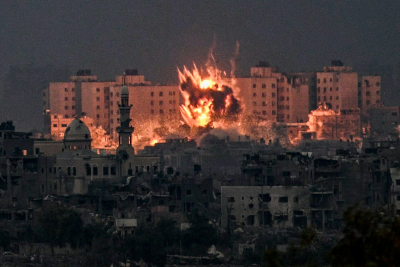Germany Buries the Evidence of Complicity in Gaza Genocide: Nicaragua Exposes It

All Global Research articles can be read in 51 languages by activating the Translate Website button below the author’s name (only available in desktop version).
To receive Global Research’s Daily Newsletter (selected articles), click here.
Click the share button above to email/forward this article to your friends and colleagues. Follow us on Instagram and Twitter and subscribe to our Telegram Channel. Feel free to repost and share widely Global Research articles.
Global Research Referral Drive: Our Readers Are Our Lifeline
***
Last Thursday, Dr Ghassan Abu-Sittah, the British-Palestinian war surgeon, gave his first address as the newly-appointed rector of Glasgow University, chosen in recognition of his work at al-Shifa hospital in Gaza.
The following day he flew to Berlin, where he had been invited to address a major conference about Palestine.
On arrival he was taken away by police, interrogated for several hours and eventually told he had to leave Germany and wouldn’t be allowed to return until at least the end of April.
Any attempt to speak to the conference via Zoom could result in a fine or even a year’s prison sentence.
By the time he was released he couldn’t have taken part in the conference anyway, since it had been already invaded by at least 900 police and closed down. Berlin’s mayor said that it was ‘intolerable’ that the conference was taking place at all.
Speaking about his experience afterwards, Dr Abu-Sittah referred to the fact that Germany had – also last week – been defending itself at the International Court of Justice against charges by Nicaragua that it is an accomplice to genocidal war.
‘This is exactly what accomplices to a crime do’ he said. ‘They bury the evidence and they silence or harass or intimidate the witnesses’.
Watching the live feed of Germany’s lawyers at the Hague a few days earlier had been an odd experience.
They gave the impression of being affronted that Germany had been accused of such crimes, especially by a small country which, they argued, had no stake in the case. Also, Israel could not yet be said to be committing genocide, because the ICJ has not yet determined the case brought against it by South Africa, which Germany had supported Israel in contesting. Because Israel was not party to the new case, it should simply be thrown out.
Some research might have given them a better appreciation of Nicaragua’s credentials to bring the case. Its mutual solidarity with Palestine goes back a long way.
It also has more experience at the Hague than Germany, including its pioneer action against the US in 1984, when it won compensation of £17 billion (that was never paid) for the damage done to Nicaragua by the US-funded Contra war and the mining of its ports.
Carlos Argüello, who led the case last week and many of its previous cases, said that Nicaragua offered its expertise to Palestine and it had already joined in with South Africa’s action. It had decided to target Germany, the second biggest supplier of arms to Israel, because the US, the biggest supplier, is outside the court’s jurisdiction on this issue.
Argüello explains that the object is to create a precedent with wider application – that countries must take responsibility for the consequences of their arms sales to avoid them being used in breach of international law. Germany’s argument that legal action cannot proceed before South Africa’s earlier case is resolved is nonsense, since countries have an obligation to prevent genocide, not merely wait until it is proven to be happening. In any case, Germany must have been aware of the numerous warnings from senior UN officials of the imminence of genocide in Gaza, which began as early as October 9th.
Germany claimed that it has a “robust legal framework” in place to ensure its arms exports are not misused, and that sales to Israel are now restricted to non-lethal equipment. But any supplies being sent to a genocidal army are helping to sustain its criminal actions, Nicaragua replied.
Much was made of Germany’s historic obligations due to its Nazi history, but Argüello argues that these should relate to the Jewish people, not the Israeli state. He adds that Germany’s past might also oblige it to help prevent genocide wherever it might occur. Its government spokesman on the South Africa case had claimed that Germany is ‘particularly committed to the Genocide Convention’.
The economist Yanis Varoufakis was also banned from speaking in Berlin. He planned to conclude his speech by telling German politicians that ‘they have covered themselves in shame’ through their unflinching support for Israel’s atrocities. Carlos Argüello echoes this point when asked whether a decision by the ICJ can actually be enforced: we have to mobilise shame, he says, ‘…that’s the hope with this. Perhaps being too idealistic, but it’s the only weapon we have’.
*
Note to readers: Please click the share button above. Follow us on Instagram and Twitter and subscribe to our Telegram Channel. Feel free to repost and share widely Global Research articles.
John Perry is based in Masaya, Nicaragua and writes for the London Review of Books, Covert Action, Global Research, The Council on Hemispheric Affairs, Fairness & Accuracy in Reporting, Counterpunch, The Grayzone and other publications.
Featured image: Israeli airstrike on an apartment building in Rafah, the last refuge in southern Gaza. Photo credit: MENAFN

